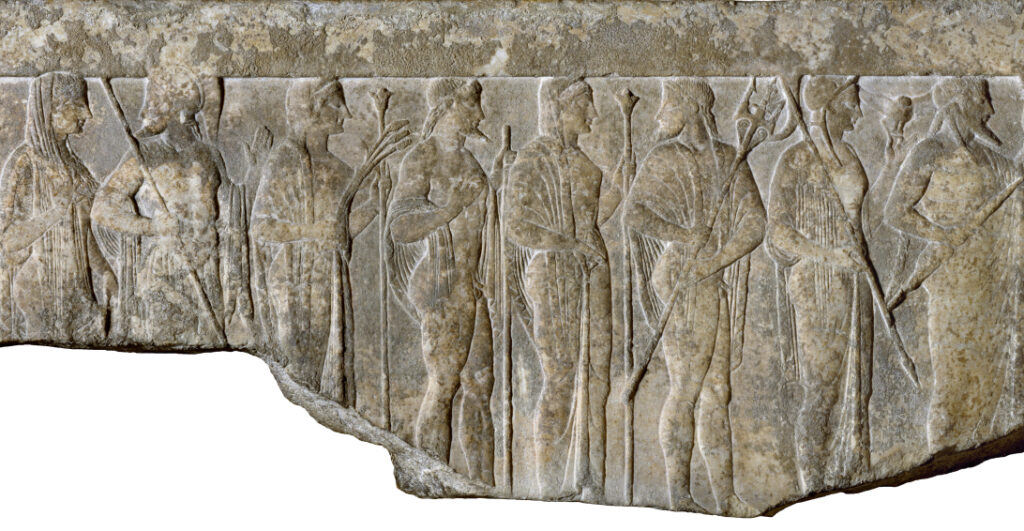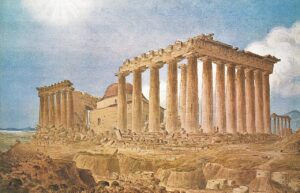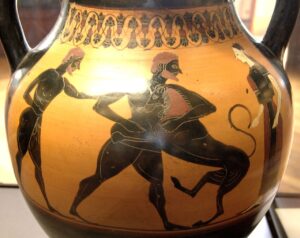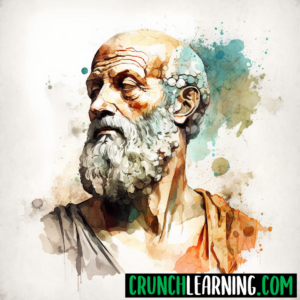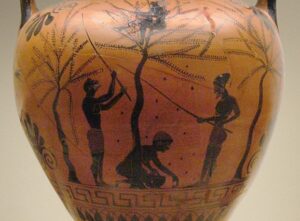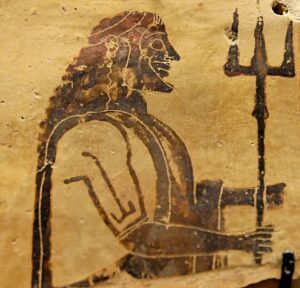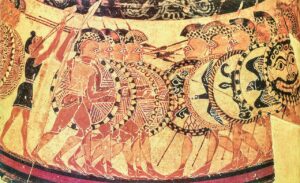There are 12 main gods and goddesses of ancient Greece in the Greek pantheon, which the ancient Greeks referred to as ‘Olympians’. These 12 gods and goddesses were considered to live on Mount Olympus, the highest mountain in Greece, and were the most powerful and important deities in the Greek religion.
These 12 main gods and goddesses of Ancient Greece were believed to have human-like emotions and often interact with mortals. They were often depicted in art and literature, and their stories and myths were an important part of ancient Greek culture and religion. They were worshiped in temples and shrines throughout Greece, and festivals and sacrifices were held in their honor. The 12 main gods and goddesses (Olympians) of ancient Greece are listed below.
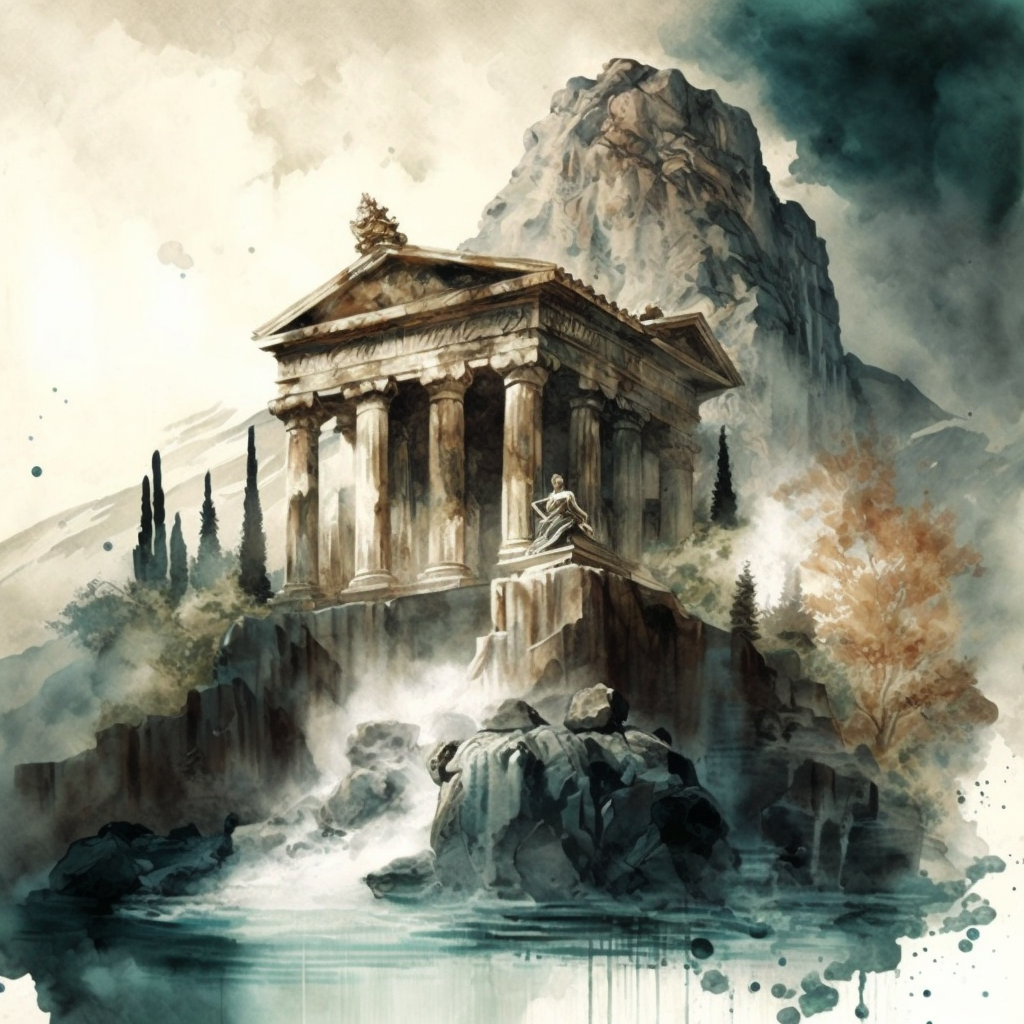
1. Zeus (Ancient Greek God of Sky and Thunder; King of the Gods of Mount Olympus)
Zeus is the king of the gods and the ruler of Mount Olympus in Greek mythology. He is the son of Cronus and Rhea (Titans of Ancient Greece) and is often depicted as a powerful, bearded man with a lightning bolt as his symbol. He is known for his many children, including Athena, Apollo, and Hermes. He is also known for his role in the defeat of the Titans and the creation of the world and humanity. In addition, Zeus is often associated with the sky, thunder, lightning, and justice.
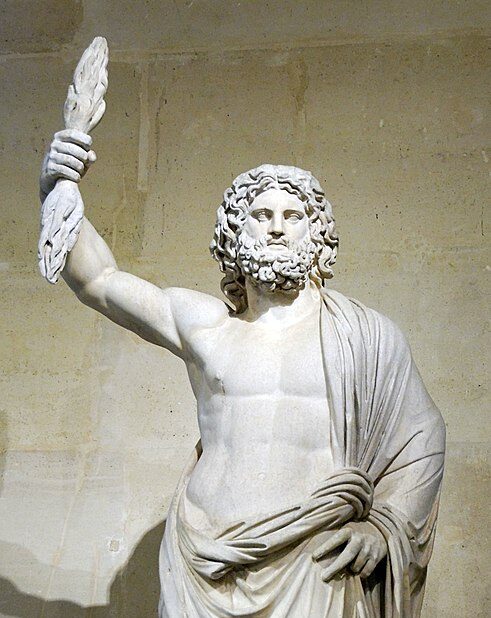
2. Hera (Ancient Greek Goddess of Marriage, Women and Family; Queen of the Gods of Mount Olympus)
Hera is the queen of the gods and the wife of Zeus in Greek mythology. She is the daughter of Cronus and Rhea and is often depicted as a beautiful, regal woman with a diadem (headband/crown) and veil as her symbols. She is known as the goddess of marriage and family, and is often associated with the sky and the stars. Hera was also often revered as a protector of women and considered as the goddess of childbirth.
3. Poseidon (Ancient Greek God of the Sea, Storms, Earthquakes and Horses)
Poseidon is the god of the sea, earthquakes, and horses. He was one of the main gods of ancient Greece. He is the son of Cronus and Rhea and the brother of Zeus and Hades. He is often depicted as a powerful man with a trident as his symbol. Poseidon is known for his role in the defeat of the Titans, as well as his role in creating horses and earthquakes. He is also known for his many children, including Triton and the Gorgons. Furthermore, he was considered as the protector of the Greek cities and maritime trade.
4. Demeter (Ancient Greek Goddess of Harvest and Agriculture)
Demeter is the goddess of agriculture, grain, and fertility in Greek mythology. She is the daughter of Cronus and Rhea and the sister of Zeus. She is often depicted as a mature woman holding a sheaf of wheat, a cornucopia, or a torch as her symbols. She is known for her role in the myth of the abduction of her daughter Persephone by Hades, which explains the seasons and the cycle of growth and decay. She is also known for her role in the Eleusinian Mysteries, an ancient Greek religious festival in honor of her and her daughter. As stated above, Demeter is considered to be the goddess of harvest and fertility, and was revered as the provider of fertility for the crops and the earth. Demeter is one of the twelve main gods in ancient Greek mythology.
5. Athena (Ancient Greek Goddess of Wisdom, Warfare and Hand Crafting)
Athena is the goddess of wisdom, warfare, and crafts in Greek mythology. She is the daughter of Zeus and Metis and is often depicted as a fierce, armored warrior and a symbol of wisdom and strategic thinking. She is known for her role in the defeat of the Titans and the creation of the world. Athena is also known for her patronage of the city of Athens, and her temple, the Parthenon, is one of the most famous ancient Greek buildings. Athena is also known for her role in many myths and legends such as the contest with Poseidon for the patronage of Athens. She is also associated with the owl, which is often depicted as her companion, and represents wisdom and strategy.
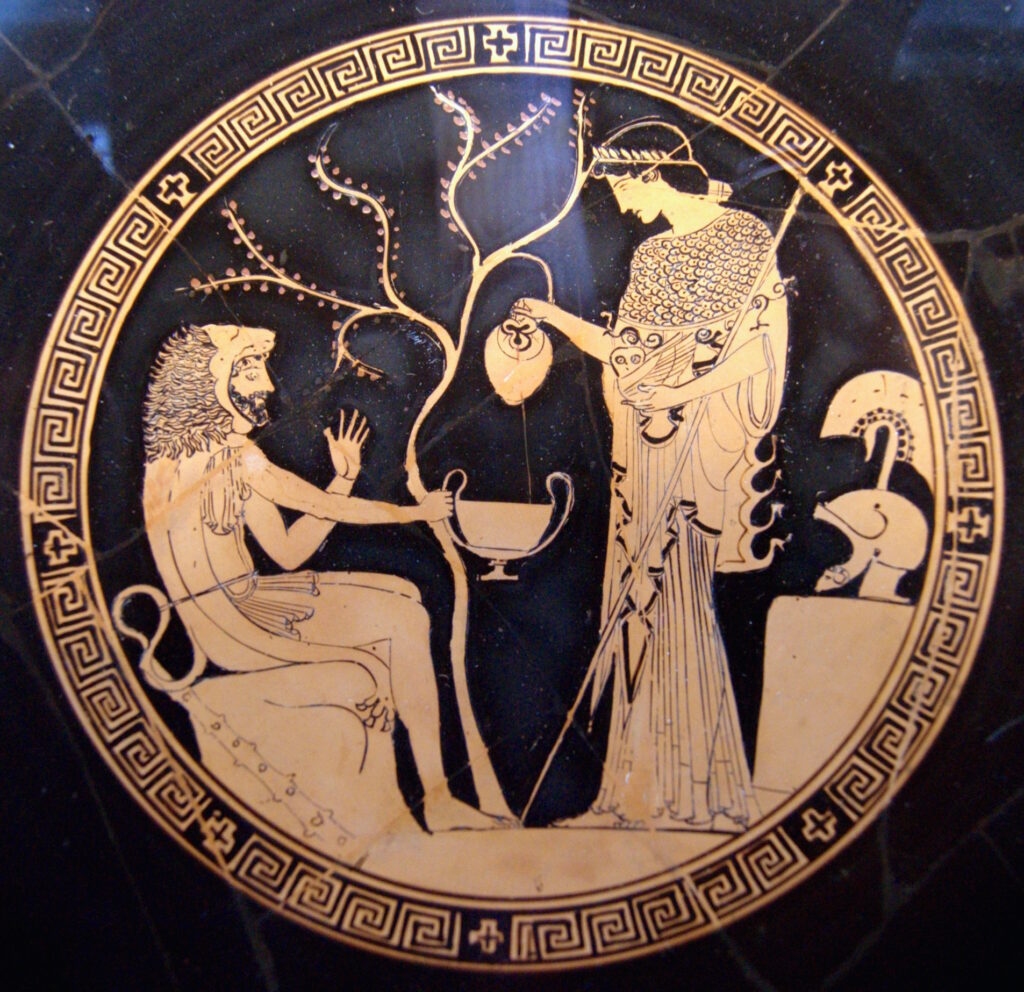
6. Ares (Ancient Greek God of War and Courage)
Ares is the Greek god of war, violence, and bloodshed. He is one of the twelve Olympian gods and is the son of Zeus and Hera. Ares is often depicted as a fierce, armored warrior with a spear or sword as his symbol. He is known for his love of violence and warfare, and is often portrayed as a destructive force, causing chaos and destruction on the battlefield. He is also known for his many love affairs and children, including Eros, Anteros, and Phobos. In contrast to Athena, who was considered the goddess of strategy and wisdom in warfare, Ares was seen as the embodiment of brute strength and bloodlust. He was not popular among the gods and mortals, and was often seen as a violent and destructive force.
7. Aphrodite (Ancient Greek Goddess of Love, Beauty and Passion)
Aphrodite is the Greek goddess of love, beauty and passion. She is one of the twelve main goddesses and was the daughter of Zeus and Dione (a goddess in ancient Greek mythology). As well, Aphrodite is often depicted as a beautiful, alluring woman with a symbol of a mirror or a dove. She is said to have been born from the foam of the sea and is associated with the planet Venus. Aphrodite is known for her beauty and charm and is often depicted as a goddess of love and desire. She is also known for her many affairs and children, such as Eros, Anteros, and the mortal Adonis. She was also seen as a protector of marriage and was sometimes celebrated during wedding ceremonies. She was considered as the embodiment of physical beauty and desire, and was revered by many people for her powers of attraction and love.
8. Apollo (Ancient Greek God of Archery, Healing, Truth, Music and Dance)
Apollo is the Greek god of music, poetry, prophecy, healing, and the sun. He is one of the twelve Olympian gods and is the son of Zeus and Leto. Artemis, another Olympian goddess of ancient Greece, was Apollo’s twin sister. He is often depicted as a handsome, youthful man with a bow and arrow as his symbol. Apollo is known for his musical and poetic abilities, as well as his role as a god of prophecy and oracles, particularly at Delphi. He is also known for his role as a god of healing and medicine, and is often associated with the arts and the humanities. Furthermore, Apollo is also known for his many children such as Asclepius and the famous Trojan prince Aeneas. He was also considered as the protector of the young and the shepherd of the Muses.
9. Artemis (Ancient Greek Goddess of the Wilderness, Nature, Hunting, Children and Childbirth)
Artemis is the Greek goddess of the hunt, wilderness, childbirth and the protector of young girls. She is the daughter of Zeus and Leto and is often depicted as a maiden hunter with a bow and arrows as her symbols. Apollo, another Olympian god of ancient Greece, was Artemis’ twin brother. Artemis is known as a protector of young girls and women. She is also known for her role as a goddess of the hunt and wilderness, and is often associated with wild animals and nature. She was also considered as the goddess of childbirth and midwifery and was revered for her role in helping women during labor. She was a powerful and independent goddess, and was respected and revered by many people.
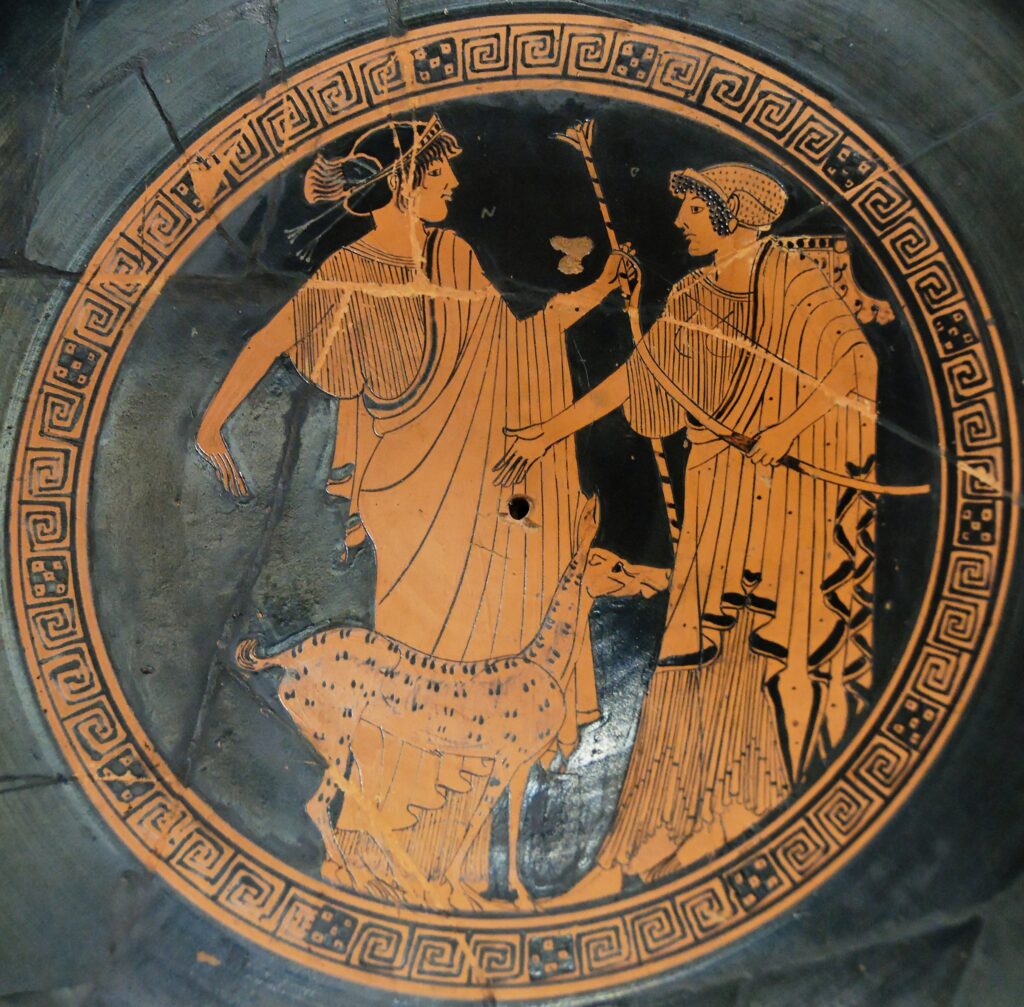
10. Hephaestus (Ancient Greek God of Metalworking, Carpentry, Fire and Volcanoes)
Hephaestus is the Greek god of blacksmiths, metalworking, fire, and volcanoes. He is the son of Zeus and Hera, and is often depicted as a strong, bearded man with a hammer and anvil as his symbols. Hephaestus is known for his skill as a blacksmith and as a craftsman, and is credited with creating many of the Greek gods’ weapons and other objects. He is also known for his role as a god of fire and volcanoes and is associated with the forge and the creation of metal objects. He was considered as the patron of artisans and craftsmen.
11. Hermes (Ancient Greek God of Messengers and Travelers; Messenger of the Gods)
Hermes is the Greek god of commerce, travelers, and messengers. He is the son of Zeus and Maia. He is often depicted as a young man with winged sandals, a winged cap, and a caduceus (a staff with two snakes entwined around it) as his symbols. Hermes is known for his role as a messenger of the gods, and is also associated with travelers. He is also known as the protector of merchants and traders, as well as the guide of souls to the underworld. He is known for his cunning and trickery and was believed to be able to move quickly and freely between the worlds of the mortal and the divine. He was also considered as the patron of athletes, and was revered for his speed and agility.
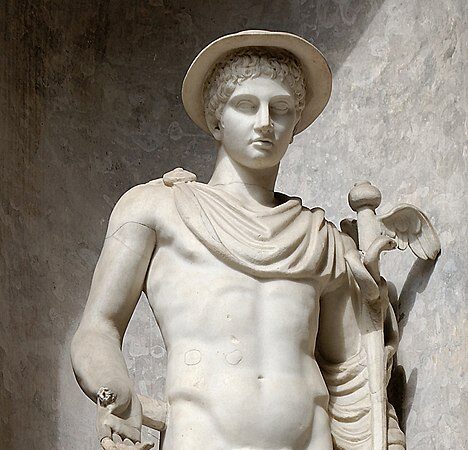
12. Dionysus (Ancient Greek God of Grapes, Winemaking, Fertility and Festivals)
Dionysus is the Greek god of wine, fertility, rituals, and festivals. He is the son of Zeus and Semele and is often depicted as a young man with a crown of ivy, grapes, or a thyrsus (a staff wreathed in ivy and tipped with a pine cone) as his symbols. Dionysus is known for his role in the cultivation of the vine and the creation of wine, but also associated with fertility and the growth of plants. He is also known for his role in religious festivals, particularly the Dionysian Mysteries, where he was honored with celebrations. He was also known for his association with theater and was considered as the patron of the Greek theater.

